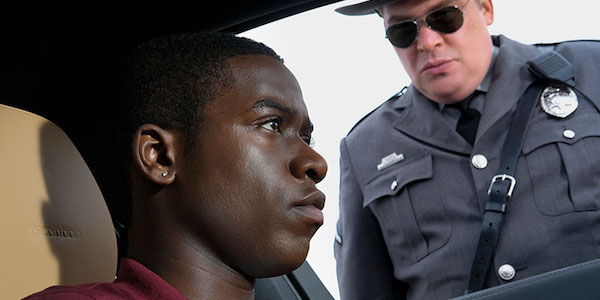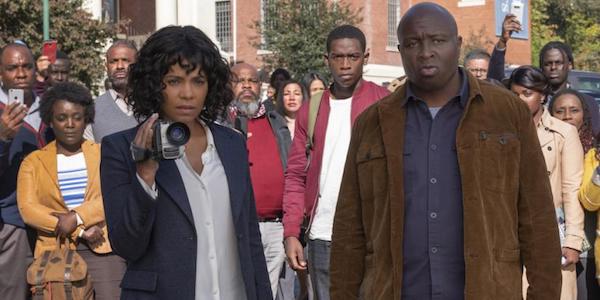THE TWILIGHT ZONE (S1E3) “Replay”: Unsubtle Storytelling Undermines A Powerful Message

Alexia (also known as Lexi) spends an alarming amount of…
The latest revival of The Twilight Zone stumbled with the premiere of its first two episodes, reminding viewers why the new series could never live up to Rod Serling’s masterwork. The show’s third episode “Replay”, which CBS All Access released on April 11th, is yet another prime example of what this reboot gets wrong.
The Most Unusual Camcorder
“Replay” stars Sanaa Lathan as Nina Harrison, a single mother who is sending her son Dorian (Damson Idris) off to college. While the two stop to eat at a diner, Nina pulls out an old-school camcorder. Naturally Dorian asks, “Can’t you just use your phone like everybody else in this century?” The camcorder feels jarringly out of place for a modernized version of The Twilight Zone.
Right away, “Replay” calls to mind the episode “A Most Unusual Camera” from the original series. While the camera in that episode helps a few criminals see into the future, it isn’t long before we discover what the camcorder in “Replay” is capable of. Nina starts filming and jokingly interviews her son. When Dorian accidentally spills ketchup on his shirt, he asks his mother to rewind the tape and record over it out of embarrassment.

Between the ketchup stain on Dorian’s shirt and the presence of a questionable cop, Officer Lasky (Glenn Fleshler), it’s obvious that this episode is severely lacking in the art of subtlety. But the supernatural element comes into play when Nina rewinds the footage and consequently rewinds time itself. With the ability to turn back the clock, Nina uses the camcorder to try to evade the police officer and save her son.
Subtlety Could Save This Series
The episode’s statement about racial profiling and police brutality is so obvious that it loses its impact. “Replay” might as well have its message spelled out in flashing lights. The concept has the potential to be effective, but lackluster writing hinders the story from packing a powerful punch.
Conversely, Serling’s The Twilight Zone was often recognized for its implementation of literary devices. Many teachers even use episodes of the show to teach their classes, whether it’s “Time Enough At Last” to illustrate the concept of irony or “The Monsters Are Due On Maple Street” to explain allegories. Part of the genius of the original series was the way in which episodes used supernatural and science fiction elements to disguise social commentary. Thus, an episode with such blatant storytelling takes away the magic. It’s not an allegory if the message is being waved around in the viewers’ faces.

It also doesn’t help that too many ideas were crammed into this story. In addition to the unmistakable political and social commentary that “Replay” makes, there’s also a statement about embracing your roots. When Dorian wants to visit his uncle, Nina often refuses only to eventually realize that she cannot run from her past. If the narrative focused solely on police brutality and racial profiling but did so in a subtle manner, it could have been a success. Regardless, the one saving grace of this episode is Sanaa Lathan, who truly embodies the pain and desperation of a mother struggling to protect her son.
Conclusion
Police brutality is such a crucial and timely topic, but it’s also one that deserves better storytelling. “Replay” has the best intentions, but its lack of subtlety waters down the impact of its message. In order to deliver such a powerful statement, it’s important to make viewers think instead of hitting them over the head with it.
When a film or television show isn’t subtle about its message, it comes across as condescending to the audience. It’s as though the writers assume viewers aren’t capable of understanding the message or discerning the symbolism for themselves. One of the joys of Serling’s The Twilight Zone was connecting the dots and ultimately realizing what the episode was really trying to say.
Three episodes in and the new series has been way too blatant with its storytelling so far. Hopefully the remaining episodes aren’t as predictable as these first three, otherwise viewers will wish they could use a camcorder to turn back time and stop themselves from ever watching this reboot in the first place.
Does content like this matter to you?
Become a Member and support film journalism. Unlock access to all of Film Inquiry`s great articles. Join a community of like-minded readers who are passionate about cinema - get access to our private members Network, give back to independent filmmakers, and more.
Alexia (also known as Lexi) spends an alarming amount of time at the movies. When she's not working or writing, she's probably at the movies. When she's not at the movies, she's probably at home watching movies with her dog. Follow her on Letterboxd here: https://letterboxd.com/lexiamoriello













